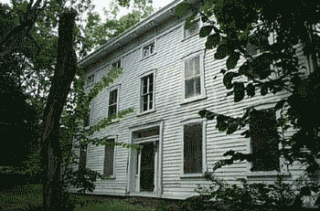The Bonnell Tavern

Although not technically in the Town of Clinton, the Bonnell Tavern has been a key part of Clinton's history since the mid 1700s. Abraham Bonnell opened his tavern in 1767. He was one of the most prominent land owners in the area, and devoted much of his efforts to political affairs. The Bonnell family descended from William Bonnell (1617 - 1669) who came from Cheshire, England, in the James in 1630 then moved to New Haven, Connecticut, in 1738. William Bonnell's son, Nathaniel, built what is today the historic Bonnell home in Elizabeth, New Jersey; he was Abraham's grandfather.
There has been a tavern on this site as early as 1764. Abraham Bonnell, who was licensed as a tavern owner in 1764, had operated the Boar's Head tavern in Ringoes prior to opening the Bonnell Tavern. In 1770, the Bonnell Tavern became the meeting and voting place for the northern section of the county.
The political activities at the tavern became even more important when, in the latter part of 1775, Charles Steward return from attending the Provincial Congress of New Jersey as delegate called a meeting of the local inhabitants at the Bonnell Tavern and organized a regiment of "minute men", supposedly the first of its kind in the colony. This was the regiment which was ordered by the Provincial Congress on February 15, 1776 to march to New York under the command of Charles Stewart, by then a colonel. These patriotic militiamen then joined forces with Major General Lee. In the following year, Abraham Bonnell was made Lieutenant Colonel of the Second Regiment of the Hunterdon County Militia. By this time, Bonnell had taken part in discussions that culminated in the Declaration of Independence, and was selected as one of the delegates to the Sons of Liberty meeting at Ringoes Tavern in the southern part of the county.
Abraham Bonnell was succeeded, in 1798, by his son Clement Bonnell, and then by other members of the Bonnell family who continued to keep the tavern.
According to one of the descendents of the Bonnell family, the tavern was also part of the Underground Railroad which moved southern slaves to freedom in the northern states in the 1800s.

